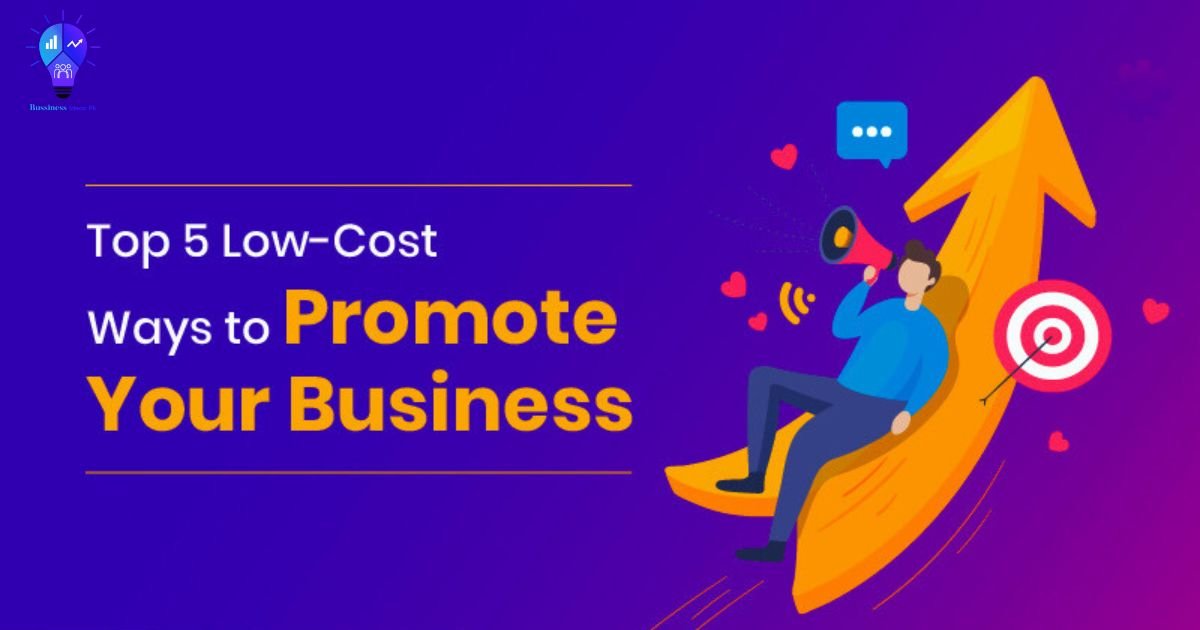Regardless of your budget, there are many effective ways to promote your business. Attending and organizing local events can help you build relationships with potential clients. Another option is to host your own community event, such as a family seasonal celebration or local farmers market. Or you can teach classes for the community and film them for online distribution. If you’re lucky enough to have a friend who can film the classes, you can post the videos to YouTube or your website. How promote your business at any budget.
Read More: Complete Guide to Social Media Marketing for Bloggers

Promoting your business with influencers
Marketing your product without a strong brand is difficult, so collaborating with influencers is a great way to reach a larger audience without spending a lot of money. Influencers have a following that far exceeds their existing customers. They can help you find new markets and gain brand loyalty. They can also help you find new ways to use your product, such as demonstrating the many uses of a pipe cleaner.
When choosing an influencer to work with, it’s important to remember that these people are still human and may fall behind on posting deadlines. They can also make mistakes when applying How Promote Your Business labels and calls to action. Influencers need to be actively involved in building the brand, but their experience will help you refine your approach over time. A formal brand ambassador program can work well. Fujifilm, for example, uses influencers to promote its products on social media.
How Promote your Business for Free
Once you’ve identified an influencer to work with, the next step is to track their activity and see if the influencer’s post has generated any sales. By providing referral codes and tracking your Twitter keywords, you can measure the results of your campaign. In addition, Sprout makes it easy to How Promote Your Business tag campaign posts in your reports, so you can compare the impact of each campaign with others.
You can also choose an influencer based on their audience and their channels. Find people who have a large following and are organically engaged. A high level of engagement indicates a loyal audience, while a low level of engagement is a sign of a fake account. Another How Promote Your Business factor to consider when choosing an influencer is how much they promote sponsored content. This is a great option if your followers respond positively to these sponsored posts.
Using social media
Using social media to promote your business at no cost can increase brand awareness and attract new customers. Setting up a business profile costs nothing and the content you share will get the attention of your target audience. You can create a customized social media strategy based on your research and target market. How Promote Your Business Creating a full social media campaign is not practical for every business. Instead, consider investing in social media marketing strategies that fit your specific needs and budget.
One of the most important things when using social media for marketing is defining your target audience. This is very important because you need to know who you are targeting before you spend money. How Promote Your Business You need to understand your audience so you know how to target them and what type of content will work best. Small business owners are often on a tight budget and must choose wisely where to spend their money. Small businesses need to make wise decisions about their marketing budget.
Before investing your money in social media marketing, think about your business model. Do you intend to sell products or build relationships? If so, your social media strategy should be geared toward building relationships and engaging with existing customers. While the latter may seem like a better idea, the former is a more effective strategy. How Promote Your Business Using social media to promote your business on any budget requires creativity and flexibility. Additionally, social media requires a strong commitment to content creation, so make sure you dedicate a portion of your budget to this strategy.

You need to measure the return on investment of your social media marketing campaigns. It’s important to use metrics like voice share, impressions, reach, referrals, and conversions to determine if your marketing efforts are worth the investment. You need to understand what drives your customers to buy and why. A social media campaign should be designed around the AIDA (attention, interest, desire, action) system.
Launching a new business or boosting an existing one takes more than just a great product or service. You need to implement promotional strategies that get the word out, build your brand, and make sales. How Promote Your Business This article explores fundamental marketing concepts and cost-effective tactics to promote a small business.
Defining Your Marketing Strategy
A sound marketing strategy is the foundation for business promotion. It entails understanding your customers, defining your brand, setting goals, and choosing channels.
- Know your target customer – Identify demographics like age, gender, income level. Understand their needs and buying motivations.
- Establish your brand – Define your brand identity and values. Reflect them consistently in messaging and visual branding like logos.
- Set specific goals – Outline concrete marketing objectives like increasing sales by 15% or acquiring 1,000 new email subscribers.
- Determine marketing channels – Evaluate promotional channels like social media, SEO, print ads, trade shows, and direct mail that will best reach your audience.
Promoting On A Budget
Small businesses can boost their visibility without overspending using these budget-friendly tactics:
- Optimize your website for search engines through keyword optimization and link building. This helps you get found online by How Promote Your Business potential customers.
- Claim and develop free business listings on Google, Facebook, Yelp and other directories. Keep info updated.
- Engage actively on social media including Facebook, Instagram, Twitter, and LinkedIn. Post updates, share content, advertise.
- Send email newsletters with tips, product launches, promotions, and human interest stories. Use a free or low-cost email service.
- Network online and in-person to connect with influencers and partners. Attend trade shows and join professional associations.
- Distribute marketing collateral like brochures, menus, catalogs to customers and at local establishments.
- Offer limited-time sales, special deals, discounts, and package promotions featured across channels.
Maximizing Your Marketing Dollars
When you have some promotional budget, make your spending more impactful with these tips:
- Invest in high-quality visual assets – Hire a pro photographer and designer. Use images and branding widely.
- Focus ad spend online – Target paid ads and sponsored posts to reach your niche on Facebook, Instagram, and Google.
- Build an email list – Offer a compelling lead magnet like a discount code in exchange for emails. Nurture with drip campaigns.
- Partner strategically – Cross-promote with complementary local businesses through co-marketing campaigns.
- Analyze performance – Track impressions, clicks, sales from efforts. Double down on tactics showing results.
- Automate where possible – Use tools like email autoresponders, social scheduling, and ads management to scale efforts.

The Importance of Consistency
To see returns, commit to marketing consistently over the long-term. Sporadic efforts fail to build brand recognition or convert leads. Devote time and budget on a recurring schedule. Revisit your strategy and realign tactics as the business grows.
Staying nimble, maximizing visibility, and keeping your brand front of mind with customers old and new will pay dividends for your small business.
Conclusion:
Well-planned marketing and promotion are vital for every small business. Define your brand identity and target audience. Combine digital approaches like SEO and social media with real-world networking and outreach. Experiment with channels and offers to How Promote Your Business determine what resonates. Track results closely to refine your strategy over time. Committing to consistent, creative promotion of your business will elevate your brand and drive sales.
Read More: How Promote Your Business
FAQs:
Q: What are some low-cost marketing tactics?
A: Low-cost marketing tactics include optimizing your website for organic search, engaging on social media, distributing marketing collateral, networking, and sending email newsletters.
Q: How can I promote my business on a tight budget?
A: Focus on low-cost digital marketing, partner with other local businesses, take How Promote Your Business advantage of free listing directories and community calendars, use social media, offer promotions and deals.
Q: What is an effective call to action for marketing?

A: Strong CTAs like “Sign up today,” “Start your free trial,” and “Shop the sale” use action words that drive the next step you want viewers to take.
Q: How often should I post on social media?
A: Posting 1-3 times per day on each social platform is typically most effective for small business marketing. Monitor engagement and adjust frequency up or down.
Q: What makes an effective email newsletter?
A: A good email newsletter is visually engaging, mobile-friendly, uses clear subject How Promote Your Business lines, and contains valuable curated content, insider tips, or special offers. Send on a consistent schedule.
Q: How do I create a marketing plan?
A: A basic marketing plan outlines your target audience, brand positioning, competitive advantages, marketing channels and campaigns, projected costs and ROI timelines.
Q: When should I begin marketing a new business?
A: Start marketing 1-2 months before your official launch. Build hype and interest in the How Promote Your Business business with a “coming soon” campaign on social media, email signup list, and word-of-mouth.
Q: What is remarketing in digital marketing?
A: Remarketing targets ads to visitors who previously interacted with your website or ads to reconnect with those who showed initial interest.
Q: How should I respond to online reviews?
A: Respond professionally to all reviews. Thank happy customers. Politely address criticisms if How Promote Your Business warranted How Promote Your Business and offer to make amends. Focus on improving any issues.
Q: What makes a good website for marketing?
A: A good marketing website is fast loading, mobile responsive, user-friendly, reflects branding, and enables conversions like sales or email signups.